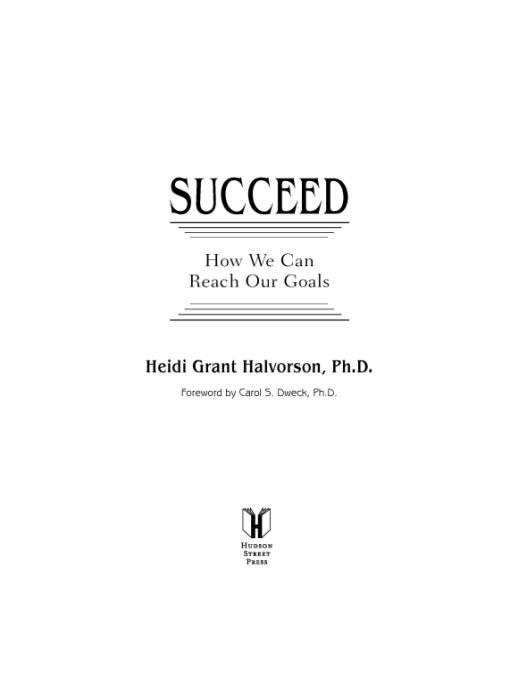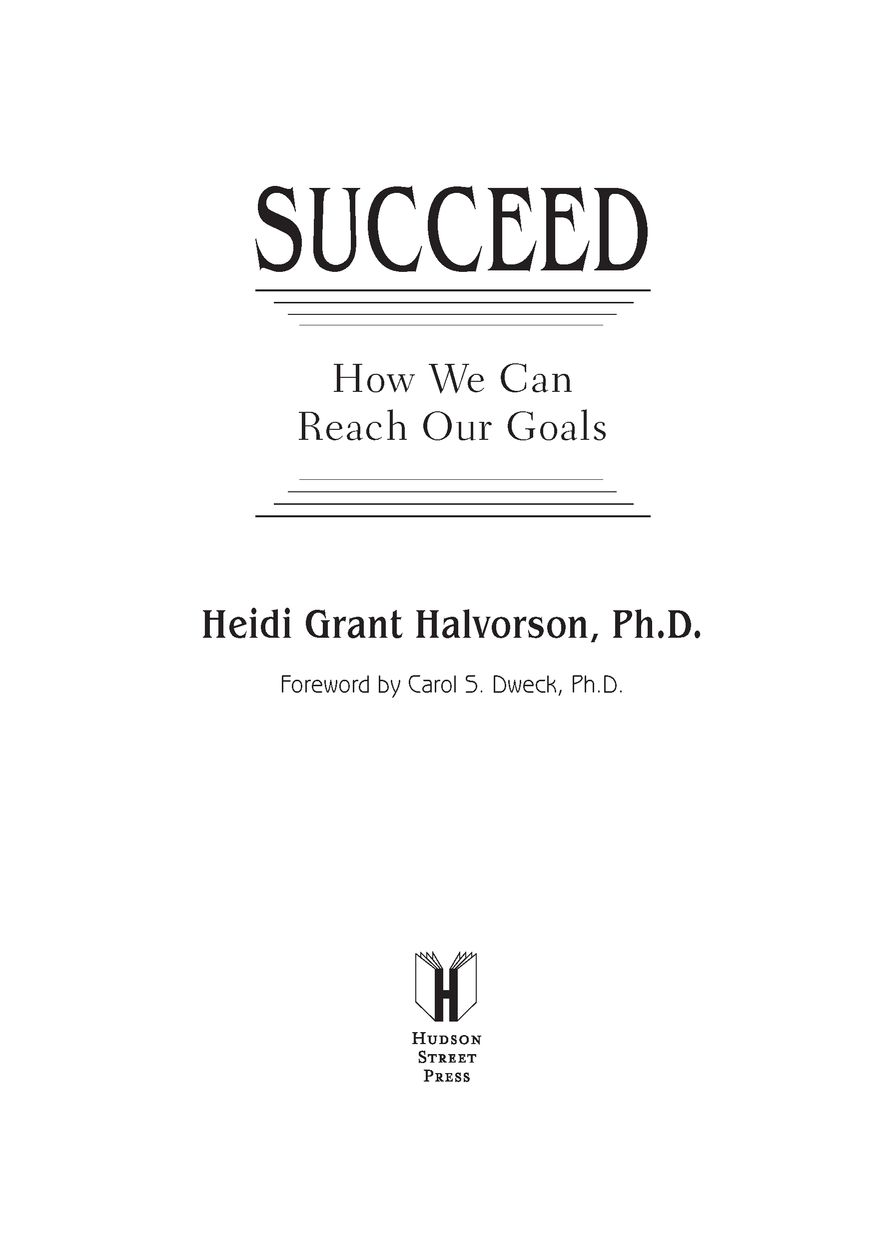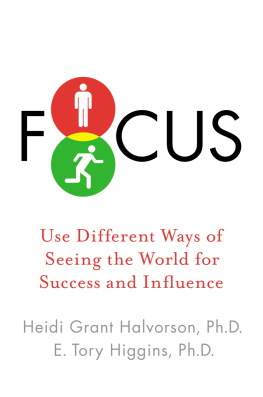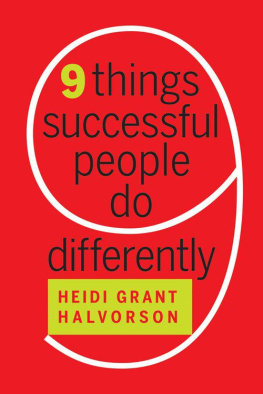Table of Contents
For my husband, Jonathan Halvorson
and our children, Annika and Maximilian
and for my mother, Sigrid Grant
Foreword
by Carol S. Dweck, Ph.D.
HEIDI GRANT HALVORSON KNOWS JUST ABOUT EVERYTHING THERE IS to know about setting goals and reaching them. In this book, she shares this knowledge with you.
She takes all the latest research in psychology, distills it to its essence, and makes it practical. Why dont you stick to your New Years resolutions? Whats the best way to make sure you get started on the report thats due? Why can focusing on grades harm students grades? How do you match your goals to your outlook on life? Why are some depressed people highly effective? She answers all of these questions (and many more) in ways you can use.
Dr. Grant Halvorson is not only a wonderful writer, shes also a researcher who did much of the research that appears in this book! She understood from the very start of her career that peoples goals were at the center of their well-being and success, and in the course of her research, she has had extraordinary insights into why people set the goals they do and why they do or dont reach them. In fact, her research has answered every question I posed in the previous paragraph.
Dr. Grant Halvorson also has great taste in other peoples research. She knows which research is important and meaningful, and she knows how to capture its essence and its practical applications. Psychological research can sometimes be rigorous without being meaningful, and it can sometimes address meaningful issues without being rigorous or trustworthy. All of the work you will read about here sheds light on the most basic processes of human motivation and has been held to the highest standards of research. Thats what makes this book so exceptional.
The most important message of this book is that people can change. Its not necessarily easy, but it is possible with the right motivation and the right information about how to go about it. The problem has always been, Where do we go to get the right information? The solution is at hand; you need only turn the page.
I am proud to have been one of Dr. Grant Halvorsons mentors, but I have been even more excited to learn from her accomplishments, her knowledge, and her wisdom. As you read this book, you will see exactly what I mean.
Introduction
WHY DO WE FAIL TO REACH OUR GOALS? WHETHER ITS WANTING TO impress our bosses, find a loving relationship, straighten out our finances, or take better care of ourselveswe all feel that there is at least one part of our lives that is in real need of improvement. (And, in reality, its usually more than just one part.) We want to do better, we even try to do better, but somehow we fall short or miss the marksometimes over and over again. So we go looking for something to blame for our failures, and most of the time we blame ourselves. We feel like we just dont have what it takeswhatever that isto reach our goals. And we could not be more wrong.
As a social psychologist, Ive spent years studying achievement. Ive carefully observed thousands of research participants pursue goals at work, in the classroom, on the playing field, and in my own laboratory. Ive asked people to fill out weeks of daily diary reports, telling me all about the goals they pursue in their everyday lives. Ive reviewed hundreds and hundreds of studies on goals and motivation. And Ive come to a few conclusions, two of which Ill share with you now.
Most of us blame our failures on the wrong things. Even very smart, accomplished people dont understand why they succeed or fail. Before I started studying this for a living, my intuitions about achievement were no better than anyone elses. I thought that I was good at school and disastrous at sports because I was born that way. I wasntactually, no one is simply born that way. I had a lot to learn.
Another conclusion Ive reached after all these years of studying achievement is that anyone can be more successful at reaching his or her goals. Anyone can. I really cant emphasize that enough. But the first step is to put aside your beliefs about why youve succeeded or failed in the past, because they are probably wrong. And the second step is to read this book.
You may not be aware that the government keeps track of this, but on its website www.USA.gov, you can find a list of the most popular perennial New Years resolutions Americans make. On that list, you probably wont be surprised to find both lose weight and quit smoking. Every January, millions of peopleand like me, you may be one of themhave set one of these two goals for themselves, vowing that this is the year that they will finally get healthy, fit into their skinny jeans, or stop spending a small fortune on cigarettes.
According to the latest reports issued by the Centers for Disease Control and Prevention (CDC), two out of three Americans are overweight, and one in three is obese. The majority of these individuals would very much prefer to weigh less. Overweight individuals not only grapple with an increased susceptibility to heart disease and diabetes, but they contend with the self-esteem-crushing consequences of being heavy in a society in which thin is in. And yet, despite an abundance of diet books and plans, and a very real and powerful desire to be slim, relatively few people who set out to lose weight actually manage to lose it and keep it off long-term. Were not getting any thinner, and our skinny jeans are still waiting for us in our closets.
The CDC also keeps track of smokerstoday, roughly one in five adult Americans smoke. In its surveys, seven out of ten smokers reported that they wanted to quit smoking completely, and nearly half of those who wanted to quit (over 19 million) had stopped smoking for at least one day in the previous twelve months in an attempt to kick the habit. Only about 3 million manage to make it lastthat means that about 85 percent of the people who want to quit, and have actually set themselves the goal of quitting, fail. In spite of all the public awareness of the serious risks to ones health, nearly half a million Americans die every year from smoking-related illnesses. So if youre a smoker and you fail to quit smoking, you may well die as a result of it. And the 85 percent of people who try to quit and fail each year know it.
So, why the high failure rates? Its obviously not that the many who try to lose weight or quit smoking arent motivated. There arent many incentives more powerful than knowing this could kill you. Why then do people fail, over and over again, to achieve goals that are vital to their well-being? The most common answer youll hear, and probably the one you were thinking when I asked that question, is that its about willpower. And by willpower, I mean some innate quality of inner strength that allows those who have it to successfully avoid temptation. Most people believe that its fundamentally a character issue. Some people have willpower (the thin, nonsmokersand we admire them for it). Others dont, and we judge them accordingly. Those who dont are simply weaker, less successful people, with less admirable character traits.
Interestingly, thats not only how we describe the failures of othersits also how we describe our own shortcomings. Countless times Ive heard colleagues, students, and friends talk about how they just cant stop smoking, just cant resist the dessert cart, just cant get going on a difficult project. And once youve decided you just dont have the willpower to lose weight or quit smoking or stop procrastinating, why bother trying? What hope is there for you?













